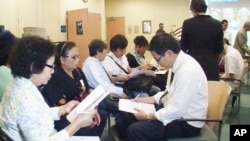Distance is perhaps one barrier that prevents US-Cambodian survivors of the Khmer Rouge from participating in UN-backed trials underway in Phnom Penh. But that did not stop Chanthorn Pech or Roath Prom from becoming participants in the tribunal’s next case—002—an atrocity trial for four jailed Khmer Rouge leaders.
The two women and 168 other Cambodians survivors in the US have filed complaints with the tribunal. And many here say they want the court to prosecute as many trials as possible.
“I was forced to work like an ox,” Roath Prom told a group of people gathered at a forum in Long Beach last month organized through the Applied Social Research Institute of Cambodia. “I was forced to crawl like a cow.” She had to hoe in the water and mud until muck filled her ears, leading to an inflammation, she said. “There was no medication. The disease remained with me until I reached the US.”
More and more people are sharing their stories, a part of a healing process that organizers say is important for traumatized Cambodians living far from home. And more people are starting to get involved in the Khmer Rouge trials taking place in their homeland.
Chanthorn Pech, who shared her own story from the Khmer Rouge period, said she did not want the court to end Case 002, which will try top leaders Nuon Chea, Khieu Samphan, Ieng Sary and Ieng Thirith for atrocity crimes later this year.
“I’m so happy I could file a complaint with the court,” she said. “And now that I know the court has accepted all the complaints, I’m happier than ever.”
Such participation is growing at a turbulent time for the UN-backed court, which is facing mounting pressure to prosecute two more cases even as observers worry it will not have the funding or will to do so.
“The court wants to stop the trials at Case 002,” Chanthorn Pech said. “I want to request the court to work on more trials.”
There was so much support in Long Beach for continued trials that organizers say they begin a petition and deliver it to tribunal officials.
Nushin Sarkarati, a lawyer for the Center of Justice and Accountability, who is handling all 170 civil cases from the US, said that Cambodians in America make up a “huge group of victims of the Khmer Rouge.”
“Their voices are very significant, and they should be aware of the proceedings before the court because it gives them a sense of justice,” she said. “Experts who have been studying the psychological impact of the war in Cambodia have found that Cambodians in America still suffer from trauma to this day. One of the ways for moving past this trauma is to see that justice happens in the court.”
Nou Leakhena, the founder of ASRIC, said that the court is just one way Khmer Rouge trauma can be mitigated. Her institute is also working with expressive art, song and dance to help the healing.
“What’s important is that we want to create an art gallery, so if the verdict does not satisfy them, we don’t want them to be hurt or their hearts to be broken again,” he said. “They just want their voices to be heard.”
Participation in court can give them “value as a human being,” she said, noting that some participants in her workshop were indeed benefiting.
“Some of them were crying,” she said. “But I can see hope in their eyes.”




